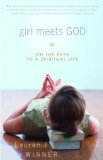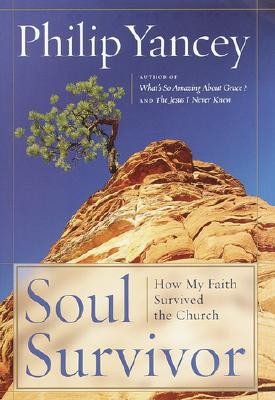Girl Meets God
 Girl Meets God is Lauren Winner’s spiritual memoir, subtitled On the Path to a Spiritual Life. I found myself contrasting it often to Blue Like Jazz, in which Donald Miller traces a similarly young and modern spiritual journey. But I found Girl Meets God far more satisfying.
Girl Meets God is Lauren Winner’s spiritual memoir, subtitled On the Path to a Spiritual Life. I found myself contrasting it often to Blue Like Jazz, in which Donald Miller traces a similarly young and modern spiritual journey. But I found Girl Meets God far more satisfying.
I really liked the first half, or maybe the first 2/3, of this book. It’s readable, scholarly in a for-a-popular-audience way, and clever. I’m interested in the relationship between Judaism and Christianity, and exploring the continuities and discontinuities between the two constitutes a central theme as Winner describes her conversion from Judaism to Orthodox Judaism to Christianity.
Here are some of the things I liked:
1.) Winner’s treatment is more thoughtful and informed than Miller’s. As an example, take her discussion of the mysteriousness of God. Here’s Donald Miller’s view: “I can no more understand the totality of God than the pancake I made for breakfast understands the complexity of me.”
Now here’s a snippet of Winner’s discussion:
Here is the thing about God. He is so big and perfect that we can’t really understand Him. We can’t possess Him, or apprehend Him… But God so wants to be in relationship with us that He makes Himself small, smaller than He really is, smaller and more humble than His infinite, perfect self, so that we might be able to get to Him, a little bit.
Being born a human was not the first time God made Himself small so that we could have access to Him. First He shrunk Himself when He revealed the Torah at Mt. Sinai. He shrunk Himself into tiny Hebrew words, man’s finite language, so that we might get to Him that way. Then He shrunk Himself again, down to the size of a baby, down into manger finiteness.
<sigh of satisfaction from me…>
2.) It’s honest. (Too many examples to cite.)
3.) It’s witty.
4.) It’s smart and bookish.
So why did I only enthusiastically like the first half or two-thirds?
1.) It’s smart and bookish. (I know, I just said that.) There are a few too many lengthy and detailed lists of challenging books read, and references to intense conversations about super-specialized erudite topics. I think the aim is self-deprecating — “See what a pointy-headed academic [her term] I am?” — but it got old.
2.) In the chapter about confession, the main point is how difficult it is to be fully honest with someone about your sins. But she had no problem coming clean for anyone who reads this book about her struggles with maintaining chastity. (She covers that territory in this book as well.) Autobiography is a confessional form; as I was reading, I remembered that Augustine’s Confessions detail his sexual sins too. It’s just that he doesn’t do it in the context of agonizing over how hard it is to talk about them. It seemed a little disingenuous.
Obviously it’s an engaging book, and I recommend it. You can get a fuller sense of the book by looking through the discussion questions suggested here. It can be a little frustrating in its inconclusiveness, but as an account of a complicated and ever deepening spiritual voyage it’s not so much about an arrival as about a journey, a weaving together of several strands. As such it’s well worth reading.


